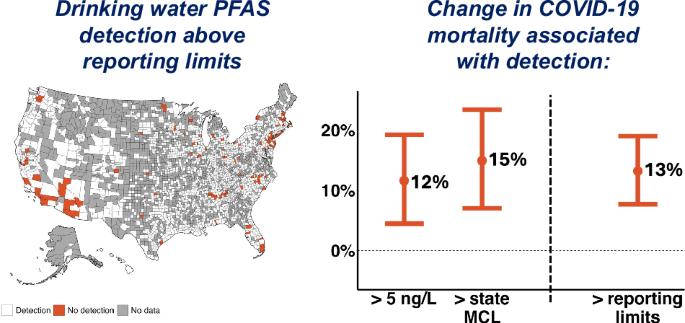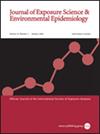美国县级饮用水 PFAS 污染与 COVID-19 死亡率之间的关联。
IF 4.7
3区 医学
Q2 ENVIRONMENTAL SCIENCES
Journal of Exposure Science and Environmental Epidemiology
Pub Date : 2024-10-06
DOI:10.1038/s41370-024-00723-5
引用次数: 0
摘要
背景:流行病学研究和动物实验都支持暴露于全氟烷基和多氟烷基物质 (PFAS) 与对免疫系统的有害影响之间的关系。因此,PFAS 被认为是导致 COVID-19 不良后果的潜在环境风险因素。目的:在此,我们研究了美国社区供水系统 (CWS) 的 PFAS 污染与县级 COVID-19 死亡记录之间的关联。我们的分析利用了两个数据集:一个是次国家级数据集(服务于 621 个县的 5371 个社区供水系统),另一个是国家级数据集(服务于 1677 个县的 4798 个社区供水系统)。次国家级监测数据集来自全州范围内的 PFAS 饮用水监测(2016-2020 年),国家级监测数据集来自未受管制污染物调查(2013-2015 年):我们使用多层次准泊松回归进行了平行分析,以估算疫苗接种开始前(2020 年 1 月至 12 月)县级 PFAS 饮用水污染度量与 COVID-19 死亡率之间关联的累积发生率。在主要分析中,这些回归结果根据若干县级社会人口因素、该县首次报告病例后的天数以及医院床位总数进行了调整:在次国家级分析中,检测到至少一种 PFAS 含量超过 5 纳克/升时,COVID-19 死亡率会升高 12% [95% CI:4%, 19%]。在全国分析中,至少检测出一种 PFAS 超过报告限值(20-90 纳克/升)与 COVID-19 死亡率升高 13%[95% CI:8%, 19%] 有关:我们的研究结果为美国地区级饮用水 PFAS 污染与 COVID-19 死亡率升高之间的关联提供了证据。这些发现加强了各州和联邦正在进行的监测工作的重要性,以支持美国环境保护局 2024 年针对 PFAS 的饮用水法规。更广泛地说,这个例子表明,饮用水质量可能对传染病的严重程度有影响。未来的研究将受益于结合地区级暴露测量和个体级结果数据的研究设计。本文章由计算机程序翻译,如有差异,请以英文原文为准。

County-level associations between drinking water PFAS contamination and COVID-19 mortality in the United States
Epidemiologic and animal studies both support relationships between exposures to per- and polyfluoroalkyl substances (PFAS) and harmful effects on the immune system. Accordingly, PFAS have been identified as potential environmental risk factors for adverse COVID-19 outcomes. Here, we examine associations between PFAS contamination of U.S. community water systems (CWS) and county-level COVID-19 mortality records. Our analyses leverage two datasets: one at the subnational scale (5371 CWS serving 621 counties) and one at the national scale (4798 CWS serving 1677 counties). The subnational monitoring dataset was obtained from statewide drinking monitoring of PFAS (2016–2020) and the national monitoring dataset was obtained from a survey of unregulated contaminants (2013–2015). We conducted parallel analyses using multilevel quasi-Poisson regressions to estimate cumulative incidence ratios for the association between county-level measures of PFAS drinking water contamination and COVID-19 mortality prior to vaccination onset (Jan-Dec 2020). In the primary analyses, these regressions were adjusted for several county-level sociodemographic factors, days after the first reported case in the county, and total hospital beds. In the subnational analysis, detection of at least one PFAS over 5 ng/L was associated with 12% higher [95% CI: 4%, 19%] COVID-19 mortality. In the national analysis, detection of at least one PFAS above the reporting limits (20–90 ng/L) was associated with 13% higher [95% CI: 8%, 19%] COVID-19 mortality.
求助全文
通过发布文献求助,成功后即可免费获取论文全文。
去求助
来源期刊
CiteScore
8.90
自引率
6.70%
发文量
93
审稿时长
3 months
期刊介绍:
Journal of Exposure Science and Environmental Epidemiology (JESEE) aims to be the premier and authoritative source of information on advances in exposure science for professionals in a wide range of environmental and public health disciplines.
JESEE publishes original peer-reviewed research presenting significant advances in exposure science and exposure analysis, including development and application of the latest technologies for measuring exposures, and innovative computational approaches for translating novel data streams to characterize and predict exposures. The types of papers published in the research section of JESEE are original research articles, translation studies, and correspondence. Reported results should further understanding of the relationship between environmental exposure and human health, describe evaluated novel exposure science tools, or demonstrate potential of exposure science to enable decisions and actions that promote and protect human health.

 求助内容:
求助内容: 应助结果提醒方式:
应助结果提醒方式:


